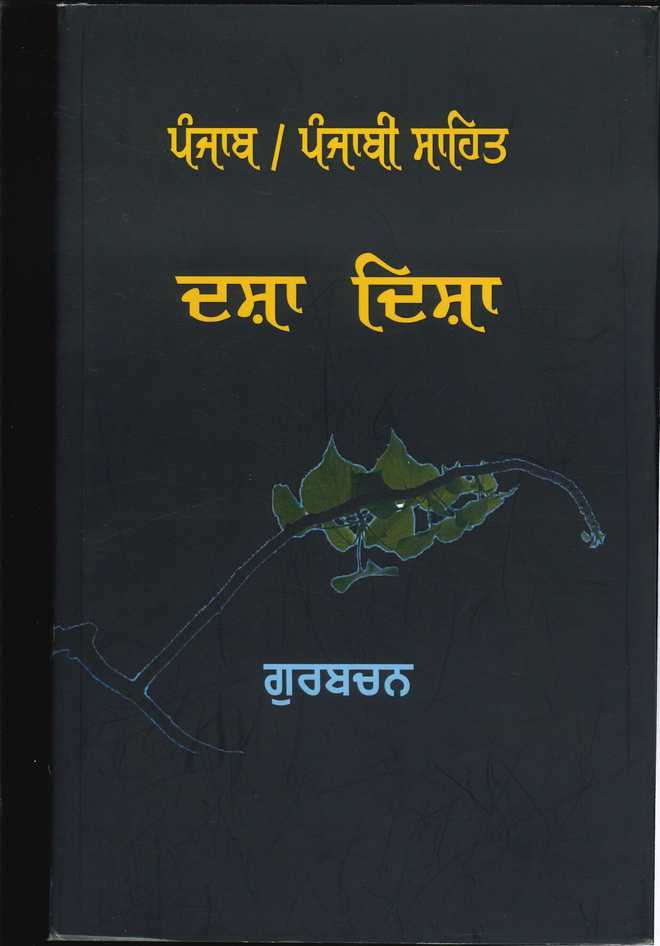
Punjab/Punjabi Sahit: Dasha, Disha by Gurbachan. Avis Publications. Pages 335. Rs 450
Jaspal Singh
In today’s Punjab, there are more Punjabi writers than readers. Kendri Punjabi Lekhak Sabha, the foremost body of Punjabi writers, has membership running into thousands. Most of these writers are poets. Almost in every Punjabi town, there is a sahit sabha that holds regular monthly meetings, where these poets recite their poems. This practice has spread even to Western countries, particularly England, Canada and the USA. Whichever town Punjabis live in significant numbers, there exists a Punjabi sahit sabha.
During these meetings after poetry recitation subsequent places on the popularity list are reserved for short story, novel, drama and creative prose, respectively. So good prose writers can be counted on fingers. Gurbachan, incidentally, is the most sought after among them. He has, by now, published about a dozen collections of delightful prose, the latest being Punjab/Punjabi Sahit: Dasha, Disha.
This collection carries 49 articles. Around half a dozen pieces are about Punjabi boys’ struggle for migration and settlement abroad. Situations presented have been analysed objectively like a social scientist not in a sentimental manner as these are usually done.
A majority of articles focus on the state of Punjabi writing and the calibre of writers. Gurbachan believes that most of these writers do not know how to construct a sensible sentence in Punjabi. The different parts of speech in sentences do not collocate properly nor are the concord and semantic harmony maintained. It is not only a question of grammatical casualness but also of the understanding of linguistic pragmatics.
Punjabi poets, with an exception of a few, do not have any historical sense or an awareness of the cultural moorings. Since they are not exposed to global intellection and the history of ideas, their mental horizon is limited to parochial sensibilities. Now-a-days children of many Punjabi writers are settled abroad, so they often write about their lives and situations but their thinking and intellectual reach is extremely cramped.
Gurbachan, being a student of world literature, having taught English for more than 30 years at Panjab University, Chandigarh, and at Delhi University, tends to compare Punjabi poets with the best in the world. He feels these poor vernacular poets have failed even to go beyond the vision of the kissakars of the bygone ages. Even if they had carried forward the tradition of Sheikh Farid, Baba Nanak or the Sufi poets, they would have achieved wonders. Instead, they chose to be pseudo ‘post-modern’ poets; hence most of their creations are funny, to say the least.
A few of the poets like Jagtar, Pash, Joga Singh and Jaswant Deed have earned Gurbachan’s praise. A few foreign-based poets, whether alive or dead, like Avtar Jandialvi, Ravinder Sahraa and Bhupinderpreet are also commended. Sadhu Singh Dhami of the Maluka fame has received superlative admiration as a representative of the great Punjabi generation in Canada that made its mark as early settlers.
The present-day Progressive Writers’ Movement, for reasons unknown, is shabbily treated for its so-called ‘hypocrisy’, though some of the writers associated with this movement have played a great role in the making of Indian literature.
Gurbachan’s vagabondish streak has taken him to almost all continents of the world. Sometimes, he had to live in adverse circumstances with limited resources in those countries but his sense of curiosity and wander-lust sustained him and gave birth to a number of readable accounts. His long stay in Delhi in the company of many well-known Punjabi writers like Harbhajan Singh, Sutinder Noor, Harnam, Tara Singh Kamil, Amrita Pritam, Dev, Devendra Satyarthi, Dr Mohanjit Singh, Ajeet Cour and others provided him with a rare inside view of their world.
He was a regular visitor to Delhi’s famous Coffee House, the great gossip centre of Delhi literati that was demolished during the Emergency. Gurbachan, a witness to all those events, wrote about these with some authenticity.
Some factual mistakes have crept into the narrative, for instance he writes that Karl Marx did his Ph.D. from Berlin University, whereas Marx did it from the University of Jena. The ‘other’ of the Greek god Apollo is not Zeus as given by Gurbachan but Dionysus, son of Zeus. The famous Irish poet of English W.B. Yeats has been mentioned as Y.W. Yeats.
Despite these small hiccups, it is a readable book.



























